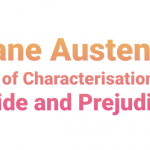Pairing two slightly contrasted “ethical” terms :
Jane Austen employs the style of pairing two slightly contrasted “ethical” terms to serve as the title of two of her novels: „Pride and Prejudice‟ and sense and Sensibility‟. Both these novels had initially, different title i.e. „First Impression‟ and Elinor and Marianne‟ respectively but on revision got the present titles. This style of “ethical” title was commonly associated with „conduct‟ fiction, the books were designed to illustrate in their stories and commentary the correct way for young women to behave in the situations. They were likely to encounter in polite mi polite middle class society- how a young lady should composed herself at dance how she should deal politely get firmly with a young man who is presenting her, how she should deal who insults her; how she should refuse an offer of marriage how she should behave towards an older woman of superior rank. And these precisely are the situations that Elizabeth Bennet has to cope with and obviously the question of her conduct is on these occasions is paramount in “Pride and Prejudice”.
Not a “conduct Fiction” :
However, Pride and Prejudice is not a “conduct Fiction” and so there is no “how” in Jane Austen, no directive about right and wrong ways to behave. Our judgments of Elizabeth do not arise from rules of propriety but from her behaviour as a unique individual in circumstances which are particular to her.
Anti-conduct fiction :
Against the morality of “conduct fiction” Jane Austen sets her own individual mode of anti-conduct fiction. In the novel as a whole, the anti-contained within the exploration of the terms“Pride and Prejudice”. Sometimes the terms are discussed and analysed directly, as they are when Elizabeth and Darcy examine themselves and scrutinize their past feeling and behaviour. More generally they force of the terms is illustrated dramatically in the scheme of characterisation, which extends outwards from the hero and heroine, showing the depth and complexity of human that can stand behind nature that can stand behind terms so decrepitly simple. In Darcy “Pride” is both positive and Negative; both a proper, justified pride in the history of his family and an offence, Elizabeth‟s “Prejudice” is the negative aspect of something positive, her spirit and high intelligence. She confesses this to Jane,
“And yet I meant to be uncommonly so decided a dislike to him, without any reason. It is such a spur to one‟s genius, such an opening for wit to have dislike of that kind. One may be continually abusive without saying anything just; but one not always laughing at a man without now and then stumbling on something witty.”
Her “Prejudice” was originally fired by her hurt “Pride” at the Meryton Ball, by Darcy‟s insulting proposal of marriage( at Hunsford) and by slanders spread by Wickham.
Complex varieties of Pride and Prejudice In Charlotte, Lucas : In Charlotte, Lucas, we watch the sinking of self-pride for the sake of marriage to a man(Mr.Collins) whose own self-pride is lost. In Mr. Bennet we see self-pride embittered, turned to malice, elated into a power of isolation and affected indifferences.
Conclusion :
The “Pride” and “Prejudice” analyses can be carried out rewardingly in all the characters but it is a narrow and static line of analyses and Jane Austen‟s statement through the novel is that characters of human complexity cannot be understood or explains by this kind of labelling. In effect, the novel rejects such fixed terms of classification and judgment and requires us to adopt the flexible and dynamic values of judgment formed in the novels structured of dramatic irony. Within that context, the terms “pride” and “ Prejudice” have a place, however not the leading role that they are assigned ironically, in the novel‟s title.


